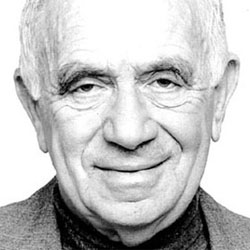On my desk there is a stone with the word “Amen” on it,
a triangular fragment of stone from a Jewish graveyard destroyed
many generations ago. The other fragments, hundreds upon hundreds,
were scattered helter-skelter, and a great yearning,
a longing without end, fills them all:
first name in search of family name, date of death seeks
dead man’s birthplace, son’s name wishes to locate
name of father, date of birth seeks reunion with soul
that wishes to rest in peace. And until they have found
one another, they will not find a perfect rest.
Only this stone lies calmly on my desk and says “Amen.”
But now the fragments are gathered up in lovingkindness
by a sad good man. He cleanses them of every blemish,
photographs them one by one, arranges them on the floor
in the great hall, makes each gravestone whole again,
one again: fragment to fragment,
like the resurrection of the dead, a mosaic,
a jigsaw puzzle. Child’s play.
Notes on the Poem
Yehuda Amichai takes us on an eye-opening journey by starting with a simple but potent object. As translated with care and respect by Chana Bloch and Chana Kronfeld, that object is given profound, talismanic meaning. From that broad sweep, it is then brought back to an intimate and resonant place among like objects. It's a powerful experience produced by a brief but unforgettable poem, well worth a revisit after it was previously featured as Poem of the Week. We see the object first on Amichai's / the narrator's desk. We are swiftly assured that this is no mundane paperweight, although it is a tangible reminder of immense, weighty and tragic forces. The object is one piece of many that have been cruelly scattered. The inventory of yearning that proceeds from that scattering is heart wrenching. Each broken connection, from "first name in search of family name" to "date of birth seeks reunion with soul that wishes to rest in peace" is a depiction of physical fragments tossed asunder as well as the vast devastation of many human lives torn apart. At the mid-point of the poem, there is an echo of the serenity with which the poem commenced: "Only this stone lies calmly on my desk and says “Amen.”" ... and then ... "the fragments are gathered up in lovingkindness by a sad good man" Amichai/Bloch/Kronfeld brings us full circle back to a type of peace and hope, by beautifully, subtly and simply bringing an object to life and imbuing it with both gravitas and the warmth of a collective human experience that is first tragic, and then transcendent. As the scattered fragments are reunited and restored, the phrase "Child's play" seems seems to be a gentle but telling rebuke, as if bringing things back together could ever really be that simple.
